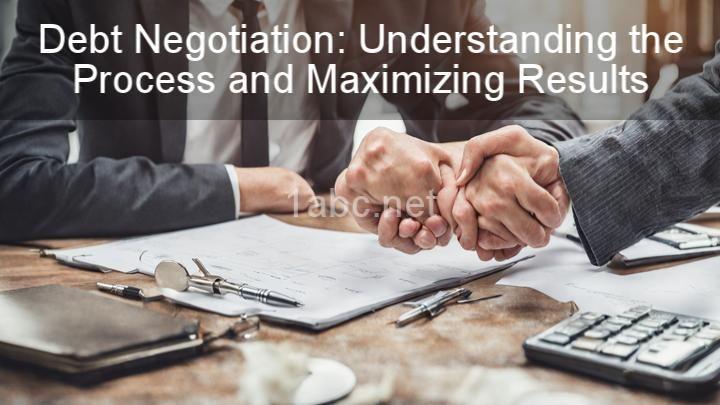Debt Negotiation: Understanding the Process and Maximizing Results

Introduction:
Welcome to our comprehensive guide on debt negotiation. In today's world, where financial challenges are common, it is crucial to understand how to effectively negotiate your debts. Debt negotiation, also known as debt settlement, is a process that allows individuals to negotiate with their creditors to reduce the amount they owe and establish a repayment plan that fits their financial situation. In this blog post, we will delve into the basics of debt negotiation, explore the process in detail, and provide tips for maximizing results.
Section I: The Basics of Debt Negotiation
A. What is Debt Negotiation?
Debt negotiation is a process through which individuals or businesses negotiate with their creditors to reduce the total outstanding debt amount. The goal is to reach an agreement that is mutually beneficial and allows the debtor to repay the reduced amount within a reasonable timeframe. Unlike other debt relief options such as bankruptcy or debt consolidation, debt negotiation focuses on reducing the principal amount owed rather than restructuring the debt.
B. When is Debt Negotiation Appropriate?
Debt negotiation can be a suitable option for individuals facing significant financial hardship, such as job loss, medical emergencies, or a sudden decrease in income. It is important to assess your financial situation and determine if negotiation is the best course of action. Debt negotiation may not be appropriate if you have a stable income and can comfortably repay your debts over time.
Section II: Understanding the Debt Negotiation Process
A. Assessing Your Financial Situation
Before entering into debt negotiations, it is crucial to assess your current financial standing. Gather information about your debts, including outstanding balances, interest rates, and any supporting documentation. This will help you determine the extent of your financial hardship and develop a negotiation strategy.
B. Developing a Negotiation Strategy
Setting realistic goals is essential in debt negotiation. Determine what you can afford to pay and communicate this to your creditors. Establishing open lines of communication and being proactive in negotiating terms can significantly impact the outcome of your negotiations. Employ effective communication techniques, such as active listening and maintaining a calm and respectful demeanor.
C. Exploring Available Options
When it comes to debt negotiation, you have two options: do-it-yourself (DIY) or hire a professional. DIY negotiation involves directly communicating with creditors and handling negotiations yourself. Hiring a professional debt negotiation company or lawyer can provide expertise, experience, and potentially better results. Consider the pros and cons of each option before making a decision.
Section III: Maximizing Results in Debt Negotiation
A. Prioritizing Debts and Creating a Repayment Plan
To maximize your negotiating power, prioritize your debts based on factors such as interest rates, penalties, and the creditor's willingness to negotiate. By focusing on high-priority debts, you can allocate more resources towards negotiating better settlements. Create a repayment plan that fits your budget, taking into account your essential living expenses and financial goals.
B. Building Rapport with Creditors
Establishing positive relationships with your creditors is crucial during the negotiation process. Treat your creditors with respect and honesty, maintaining open lines of communication. Building rapport can lead to more favorable negotiations and potential concessions from your creditors.
C. Reviewing Settlement Offers Carefully
When a settlement offer is presented by your creditor, review it carefully. Assess the terms, including the total amount to be repaid, repayment timeline, and any potential long-term consequences. Consider seeking professional advice or consulting with a financial advisor to ensure the offer aligns with your goals and financial capacity.
Section IV: Additional Tips for Successful Debt Negotiation
A. Protecting Your Rights as a Consumer
As a consumer, you have rights under various consumer protection laws, such as the Fair Debt Collection Practices Act (FDCPA). Familiarize yourself with these laws to ensure your creditors are acting within legal boundaries. If you believe your rights are being violated, seek legal assistance from reputable consumer protection organizations or lawyers specializing in debt negotiation.
B. Staying Motivated Throughout the Process
Debt negotiation can be a challenging and lengthy process. It is important to stay motivated and focused on your goal of financial freedom. Set milestones, reward yourself for progress, and seek support from friends, family, or online communities. Remember, successful debt negotiation is possible, and many individuals have achieved remarkable outcomes.
Conclusion:
In conclusion, debt negotiation is a valuable tool for individuals facing financial hardship. Understanding the process and implementing effective negotiation strategies can greatly impact the results. By assessing your financial situation, developing a negotiation strategy, and exploring available options, you can maximize your chances of reaching favorable settlements. Prioritizing debts, building rapport with creditors, and carefully reviewing settlement offers are key to achieving successful outcomes. Remember to protect your rights as a consumer and stay motivated throughout the process. Take action today and explore debt negotiation as a viable solution for your financial challenges.
FREQUENTLY ASKED QUESTIONS
What is debt negotiation?
Debt negotiation is a process in which a debtor and a creditor come to an agreement regarding the repayment of a debt. It typically involves the debtor and creditor negotiating new terms, such as lower interest rates, reduced monthly payments, or debt forgiveness. The objective of debt negotiation is to reach a mutually beneficial arrangement that allows the debtor to repay the debt while relieving some financial burden. It can be done independently by the debtor or with the assistance of a professional debt negotiator. Debt negotiation can be an alternative to bankruptcy and can help individuals or businesses manage their debt more effectively.
How does debt negotiation work?
Debt negotiation is a process where a debtor negotiates with a creditor to reach a mutually agreed-upon settlement for an outstanding debt. Here's a general overview of how debt negotiation works:
- Assess your financial situation: Start by evaluating your overall financial situation, including your income, expenses, and outstanding debts. This will help you determine how much you can afford to offer as a settlement.
- Research and gather information: Gather all relevant information about your debt, such as the amount owed, interest rates, and any past payment history. This will help you negotiate effectively with your creditor.
- Contact the creditor: Reach out to your creditor, either in writing or by phone, to express your interest in negotiating a settlement. Be prepared to explain your financial hardship and why you are unable to repay the debt in full.
- Propose a realistic settlement: Offer a reasonable amount that you can afford to pay as a settlement. Typically, creditors are more willing to negotiate if they see that you genuinely want to resolve the debt.
- Negotiate and document: During the negotiation process, be prepared to discuss various repayment options, such as a lump sum payment or a structured payment plan. Keep a record of all communication and agreements made with the creditor.
- Obtain a written agreement: Once both parties agree on a settlement amount, request a written agreement that clearly outlines the terms of the settlement, including the reduced amount, payment schedule, and any other conditions. Always review the agreement carefully before signing.
- Fulfill the settlement agreement: Make payments according to the agreed-upon terms until the debt is fully settled. It's crucial to follow the repayment plan to maintain a good relationship with the creditor and prevent any further collection efforts.
Please keep in mind that debt negotiation may not always be successful, and some creditors may not be willing to negotiate. In such cases, you may need to explore other debt relief options like debt consolidation, debt management plans, or, as a last resort, bankruptcy. It's advisable to seek professional advice from credit counselors or financial experts to guide you through the process.
Why should I consider debt negotiation?
Debt negotiation can be a helpful option in certain situations. Here are a few reasons why you might consider it:
- Reduce your debt: Debt negotiation can potentially help you reduce the total amount of debt you owe. By negotiating with your creditors, you may be able to settle your debts for less than the original amount.
- Avoid bankruptcy: If you're facing significant financial hardship and considering bankruptcy, debt negotiation can be an alternative solution. It allows you to avoid the negative consequences associated with bankruptcy, such as a damaged credit score or potential loss of assets.
- Create an affordable repayment plan: Debt negotiation can help you establish a manageable repayment plan based on your financial situation. It allows you to work with your creditors to develop a payment arrangement that fits your budget.
- Minimize stress: Being in debt can lead to a high level of stress and anxiety. By negotiating your debts, you can potentially reduce the burden and worries associated with your financial obligations.
It's important to note that debt negotiation may not be suitable for everyone, and the outcomes can vary depending on individual circumstances. Before making any decisions, it's advisable to seek professional advice and carefully evaluate all available options.
Can anyone use debt negotiation services?
Yes, anyone can use debt negotiation services. Debt negotiation is a process where a professional or a company negotiates with your creditors on your behalf to lower the amount of debt you owe. It is usually recommended for individuals or businesses who are unable to meet their debt obligations and are looking for ways to reduce their debt burden. It is important to note that debt negotiation services may not be suitable for everyone, and the effectiveness of these services may vary depending on individual circumstances. If you are considering debt negotiation services, it is advisable to research and understand the process, fees involved, and potential implications before making a decision.




